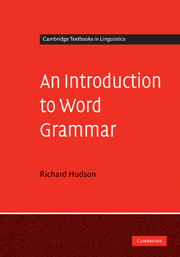Introduction
Published online by Cambridge University Press: 05 June 2012
Summary
This book consists of three parts, each of which is an introduction to a separate discipline: cognitive science, linguistics (a branch of cognitive science) and English grammar (a branch of linguistics).
Part I, called ‘How the mind works’, is a very modest alternative to Steven Pinker's bestseller of the same name (Pinker 1998a), and is a personal selection of rather commonplace psychological ideas about concepts and mental networks and the activation that flows round them, together with a few novelties such as default inheritance and node building. These ideas are selected so as to provide a foundation for the next part.
In Part II, ‘How language works’, I make a theoretical point that's exactly the opposite of the one made famous by Pinker, following the mainstream Chomskyan tradition (Pinker 1994). Where Pinker finds a ‘language instinct’, I find ordinary cognition. Like other ‘cognitive linguists’, I believe that language is very similar to other kinds of thinking. I also believe that the fine details that we linguists find when looking at language tell us a great deal not only about language, but also about how we think in general. Every single phenomenon that I know about, as a linguist, is just as you'd expect given the way in which (according to Part I) the mind works.
Finally, Part III, ‘How English works’, gives a brief survey of English grammar. The chapter on syntax summarizes my little 1998 textbook English Grammar which supported my first-year undergraduate course on English grammar.
- Type
- Chapter
- Information
- An Introduction to Word Grammar , pp. 1 - 4Publisher: Cambridge University PressPrint publication year: 2010

